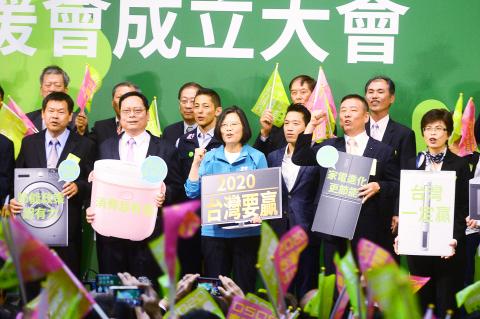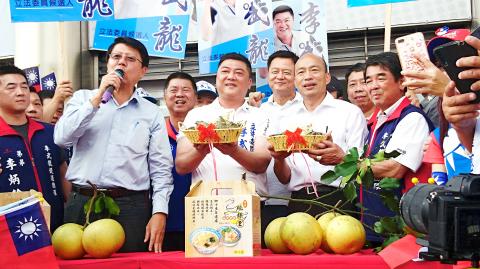Campaigning for next year’s presidential and legislative elections is heating up, with the nation’s biggest two political parties stepping up efforts to rally their support bases.
Looking toward a second term, President Tsai Ing-wen (蔡英文) of the Democratic Progressive Party (DPP) yesterday told a campaign event in Taipei that she hopes to see a high turnout rate and votes for the party on Jan. 11.
“We want to show the world the will, values and choice of the Taiwanese public,” Tsai said, adding that every day until election day is critical and that “everyone should unite and protect Taiwan.”

Photo: Wang Yi-sung, Taipei Times
“I do not want to see the public divided because of the election,” she added, calling for people across the political spectrum — regardless of their support for Taiwanese independence, the Republic of China (Taiwan) or others — to set aside their differences.
“Our election should be a process of banding together and showing the world that Taiwan is not only resolved, but also united in defending its sovereignty and democracy,” Tsai said.
Comparing the process of national development to that of building a house, the president asked the crowd to not “change the blueprint in the middle of construction” and appealed for their support for another term in office.

Photo: Yang Chin-cheng, Taipei Times
Separately yesterday, Kaohsiung Mayor Han Kuo-yu (韓國瑜), the Chinese Nationalist Party’s (KMT) presidential candidate, embarked on a two-day trip to canvass votes in Tainan, a traditional stronghold of the DPP.
Han told the crowd at a campaign event that Taiwanese have had it rough over the past few years and they should change their fates through their ballots.
Han — who was also stumping for Lee Wu-lung (李武龍), the KMT legislative candidate for Tainan’s Madou District (麻豆) — said that should he and Lee be elected, they would serve the public and not be driven by a desire for power.
Farmers, fishers, workers and other ordinary people constitute the backbone of society, Han said, adding that if they “lead prosperous lives, then everyone in Taiwan would enjoy prosperity.”
Farmers and fishers are not reaping the benefits of their hard work, as their produce and fisheries products have no sales channels, or are being sold at a fraction of their actual worth, he said.
Taiwanese must realize that no political party should be above the public — it should be the other way around, Han said.
People’s support for political parties should not be fixed, but rather given to parties that do well, and those that fail should withdraw, he said.
“The people of Tainan should wake from their dreams,” Han said, adding that if they want a highly efficient government, the promise of economic development, effective educational policies and strong foreign affairs, they should vote for him.
Additional reporting by Yang Chin-cheng

Taiwan is stepping up plans to create self-sufficient supply chains for combat drones and increase foreign orders from the US to counter China’s numerical superiority, a defense official said on Saturday. Commenting on condition of anonymity, the official said the nation’s armed forces are in agreement with US Admiral Samuel Paparo’s assessment that Taiwan’s military must be prepared to turn the nation’s waters into a “hellscape” for the Chinese People’s Liberation Army (PLA). Paparo, the commander of the US Indo-Pacific Command, reiterated the concept during a Congressional hearing in Washington on Wednesday. He first coined the term in a security conference last

Prosecutors today declined to say who was questioned regarding alleged forgery on petitions to recall Democratic Progressive Party (DPP) legislators, after Chinese-language media earlier reported that members of the Chinese Nationalist Party (KMT) Youth League were brought in for questioning. The Ministry of Justice Investigation Bureau confirmed that two people had been questioned, but did not disclose any further information about the ongoing investigation. KMT Youth League members Lee Hsiao-liang (李孝亮) and Liu Szu-yin (劉思吟) — who are leading the effort to recall DPP caucus chief executive Rosalia Wu (吳思瑤) and Legislator Wu Pei-yi (吳沛憶) — both posted on Facebook saying: “I

Sung Chien-liang (宋建樑), who led efforts to recall Democratic Progressive Party (DPP) Legislator Lee Kun-cheng (李坤城), was released on bail of NT$80,000 today amid outcry over his decision to wear a Nazi armband to questioning the night before. Sung arrived at the New Taipei District Prosecutors’ Office for questioning in a recall petition forgery case last night wearing a red armband bearing a swastika, carrying a copy of Adolf Hitler’s Mein Kampf and giving a Nazi salute. Sung left the building at 1:15am without the armband and covering the book with his coat. Lee said today that this is a serious

A mountain blaze that broke out yesterday morning in Yangmingshan National Park was put out after five hours, following multi agency efforts involving dozens of fire trucks and helicopter water drops. The fire might have been sparked by an air quality sensor operated by the National Center for High-Performance Computing, one of the national-level laboratories under the National Applied Research Laboratories, Yangmingshan National Park Headquarters said. The Taipei City Fire Department said the fire, which broke out at about 11am yesterday near the mountainous Xiaoyoukeng (小油坑) Recreation Area was extinguished at 4:32pm. It had initially dispatched 72 personnel in four command vehicles, 16